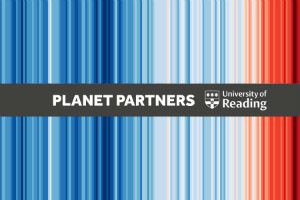#PlanetPartners: Weather forecasting innovation
17 October 2019

Through a 40-year partnership with The European Centre for Medium Range Weather Forecasts (ECMWF) we are advancing understanding of weather and climate, training the next generation of climate scientists and making a real-world impact on the humanitarian aid response to extreme weather events.
The University is advancing innovations in weather, climate, earth observation and data assimilation science through a diverse range of research programmes, knowledge exchange activities and external partnerships. Working together for over 40 years, the University's partnershipwith ECMWF is one of our most valued.
In 2019, 35 live joint projects including large European Union projects have enabled the latest Reading research to support ECMWF's work as the world-leading centre for medium-range weather forecasting (forecasts of weather three to ten days ahead).
A long-established element of the partnership is in the education and training of the next generation of climate scientists. For example, ECMWF and the University co-supervise PhD students as part of the SCENARIO NERC Doctoral Training Partnership. Also, ECMWF's atmospheric model and data assimilation system known as the Integrated Forecasting System (IFS) is made available to University of Reading Masters-level students through the OpenIFS programme to support research and teaching.
35 live joint projects including large European Union projects have enabled the latest Reading research to support ECMWF's work as the world-leading centre for medium-range weather forecasting
In 2015 the University established the £13million Institute for Environmental Analytics (IEA) to develop the technologies and skills needed to translate cutting-edge environmental research and deliver commercially relevant solutions with business.
IEA has established a pipeline of pre-commercial projects, with The Copernicus Climate Change Service operated by ECMWF, developing data analytics tools with end users in a range of markets and stimulate commercial innovation.
Our research also supports reanalysis activities at ECMWF. Reanalysis focuses on the best possible representation of the atmosphere and ocean over the course of past decades.
For example, at the University the most useful information from old satellite data has been mined and for the first time satellite movies of hurricanes from the early 1970s have been produced which can then be compared to what previous reanalyses had said was happening in that area at the time.
Under SHEAR (Science for Humanitarian Emergencies & Resilience), an interdisciplinary research programme launched in 2016 and funded by DFID alongside the Natural Environment Research Council, University of Reading scientists are investigating how forecasts can be used to take early humanitarian action.
These collaborations are not only making significant advances in our understanding of weather and climate, they are also having a critical impact on humanitarian aid response following extreme climatic events.
Most recently, following devastating flooding in Mozambique scientists at the University led work to provide emergency flood hazard reports to the UK's Department for International Development (DFID), in close collaboration with ECMWF and the University of Bristol.
Two ongoing SHEAR projects informed these emergency reports. In June 2019, Professor Hannah Cloke, who leads research into forecasting and modelling environmental processes and Natural Hazards, was awarded an OBE in the Queen's Birthday Honours. The honour was in recognition of her work including advising the UK government on national and international flooding events.
